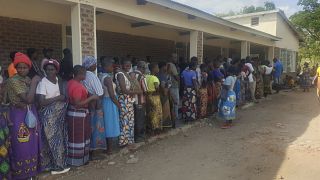Malawi
Malawi has launched a new generation of typhoid vaccines making it the first country in Africa using the vaccines to fight typhoid infections in children.
Four-year-old Golden Kondowe was the first child to receive the vaccine, on Wednesday (January 21) in Blantyre’s Ndirande Township.
The settlement has registered at least 100 cases of Typhoid, and is said to be a high risk area.
The clinical trials are meant to test the efficacy and cost-effectiveness of the typhoid conjugate vaccine (TCV) according to the Malawi-Liverpool Wellcome Trust which is running the programme.
About 24,000 children aged from nine months to 12 years will take part in the study funded by the Bill and Melinda Gates Foundation.
“Many parents are sceptical about the vaccine. But I know it will be helpful. We just have to protect our children and babies. typhoid is claiming many lives both in rural and urban areas,” said Christopher Kondowe, Golden’s father.
“The coming in of this vaccine is very significant in Ndirande because we have a huge population of about 140,373. And with the study that our colleagues did, they found that Ndirande has a lot of typhoid cases. So, the coming in of this vaccine will help to reduce the number of cases that we register,” said Mwagomba, a senior nursing officer.
Typhoid is a highly contagious infection caused by the Salmonella enterica serovar Typhi bacteria. It is contracted by consuming contaminated foods or drinks and symptoms include nausea, fever, abdominal pain and pink spots on the chest. Untreated, it can be fatal.
Health workers are conducting awareness campaigns to educate residents on prevention and cure of the disease.
The new vaccine against typhoid has been approved by the World Health Organization (WHO).
The GAVI global vaccine alliance said last year it had earmarked $85 million to help support the introduction of typhoid vaccines in poor countries.
A team of researchers from the University of Liverpool and the Liverpool School of Tropical Medicine has been working with their local counterparts to develop the vaccine for about 20 years.
Typhoid is usually treated with antibiotics. But access to antibiotics in poor regions is sometimes limited, and the bug’s resistance to them is on the rise.
Professor Melita Gordon, is the principal investigator, at Malawi-Liverpool Wellcome Trust.
“Until about five years ago, there was relatively little typhoid here in Blantyre, in Malawi. And what we have been able to show is that there has been a big outbreak not only in Malawi, in Blantyre but across many big cities in Africa. And we have been able to show that this is a new strain of typhoid that came across to the continent from the Indian subcontinent and it is multi-drug resistant which means that it is transmitted very quickly and spread very quickly,” she said.
Typhoid fever affects between 12 and 20 million people worldwide in regions where the quality of water and sanitation is low, particularly in south Asia and sub-Saharan Africa.
Around 1 in 100 cases is deadly, and about 3 percent of those infected become chronic carriers of the disease.
Reuters













Go to video
First Malaria treatment for babies approved
01:04
South Africa reports new bird flu outbreak on poultry farms
Go to video
Over 40 killed in attack on Sudanese hospital: WHO Chief condemns “Appalling” strike
Go to video
Ghana confirms 34 new Mpox cases, total rises to 79
01:07
WHO says the mpox outbreak remains a public health concern
01:37
Sudan faces rapidly-spreading cholera outbreak, 1000 daily cases in capital